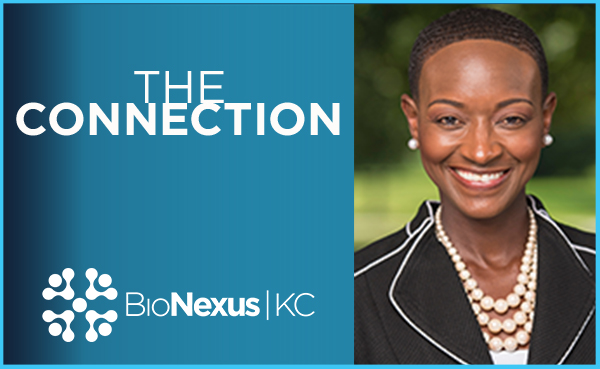
When advocating for the uninsured and underserved communities in and around Kansas City, there are plenty of immediate needs, but the bigger obstacles are upstream. Qiana Thomason, President and CEO of the Health Forward Foundation, not only targets the existing need for healthcare access within their service area but also addresses the societal influencers that impact communities head-on. She motivates her organization to be a change agent that can create an equal opportunity for all innovators, regardless of race. This bold and direct approach aims to quickly adopt a positive change for the most vulnerable areas in KC.
The best way to describe Thomason’s vision is to explain her deviation from the widely used term, Social Determinants of Health. These non-medical factors impact health and are often categorized as social, physical, economic, and environmental. Thomason chooses to substitute the word influencers instead of determinants within her organization. “People are resilient, and our outcomes don’t have to be determined by our circumstances,” Thomason said.
Resiliency was an early lesson for Thomason. A true Kansas Citian, she was born in City Center, but her mother wanted better for her and her two older brothers, so she rented a studio apartment in a neighboring school district. They couldn’t afford to furnish the space immediately, but it provided them a better opportunity and was worth the sacrifice. “I remember leaving school and doing homework on the floor of that apartment before returning home,” Thomason recalled.
This early lesson led to a diversity of experiences that brought her to the leadership position she currently holds. She completed her undergraduate work at Florida A&M University in Tallahassee and had no intention of returning to Kansas City until the University of Kansas brought her home on scholarship to complete her master’s degree in social work. This educational foundation has impacted her view of every element of her career. “I’ve been able to leverage my social work background in so many areas: policy, healthcare delivery, healthcare payment, even in my early days in child welfare, foster care, psychiatric care, behavioral health, and now health philanthropy,” Thomason said.
Beginning her current role in January 2020 presented a unique landscape for entering the world of non-profit philanthropy. Even with the complexity that the current pandemic and public health crisis present, Thomason’s vision towards the future is undeterred. In her view, the root of poor outcomes in Health Forward’s service areas is the structural and systemic factors that created them. “We’re looking further upstream and positioning to address root causes of poverty and racism head-on as those are the factors I see as the underlying ills, if you will, of poor health outcomes,” Thomason said.
To inform that change, Thomason analyzes models that have had the most positive impact on poverty. For example, some communities have used affordable housing as a lever to improve health. These communities have diversified not only in a multi-racial way but also in a mixed-income, multi-ethnic, and inter-generational way. “Communities that have a rich tapestry of diversity, especially with respect to income, are seeing all boats rise in those communities, so I’m attracted to those models; concentrated poverty just attracts more poverty and more crime,” Thomason said.
Thomason also recognizes opportunity for change within her own organization, and that drives her to position Health Forward as equity practitioners. Health Forward provides approximately $20,000,000 in funding annually to organizations that serve the uninsured and underserved within their service area. An evolving commitment is to ensure that grassroots organizations and organizations led by and serving predominantly people of color have greater access to these resources., “Often times, we see these smaller organizations that are led by and serving people of color have difficulty competing with larger organizations with scale, resources, infrastructure, and capacity. Recognizing these organizations are vital partners in addressing health injustices, we have to ask ourselves why they are struggling with obtaining access to capital. How can we be helpful in terms of technical assistance, capacity building, changing our processes around our applications, everything, to make them more competitive and help to include and fortify them so that they can get funding not only from Health Forward but from other foundations and entities,” Thomason said.
The immediate needs are ensuring that Health Forward partner communities have access to high-quality and accessible healthcare services, and the social, physical, economic, and environmental influencers are the most impactful ways to address the root causes. Thomason is fearless in recognizing the challenges and opportunities internally and externally and is prepared to tackle them all head-on in concert with her colleagues and board of directors. “This journey of awareness will never end, and we plan to look at ourselves from end to end on how to advance as an organization and be the equity practitioners that our community needs us to be,” Thomason said. “We are readying ourselves, but we can’t do it alone.” The whole system must acknowledge and address these issues so that meaningful, measurable, and positive change can be systemic.